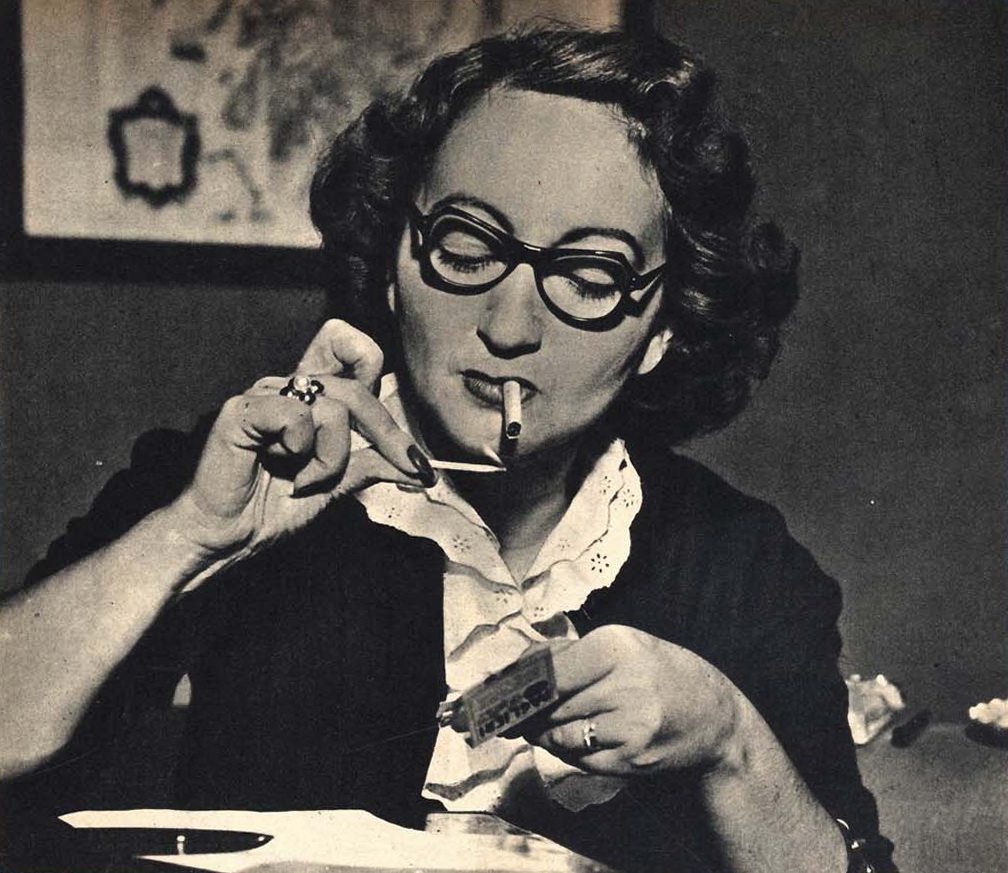
Alba de Céspedes pictured in the Italian magazine Epoca, vol. VII, no. 86, May 31, 1952. Public domain, via Wikimedia Commons.
Forbidden evokes, to my English-speaking ear, the biblical fruit whose consumption leads to shame and expulsion from Paradise. Eve’s story is not irrelevant to a novel like Alba de Céspedes’s Forbidden Notebook, in which a woman succumbs to a temptation: to record her thoughts and observations. Valeria Cossati’s impulse to keep a diary leads not so much to the knowledge of good and evil as it does to the self-knowledge advocated by Socrates and serving as a cornerstone of philosophical inquiry ever since. In Valeria’s case, it also leads to solitude, alienation, guilt, and painful lucidity.
The Italian title of Forbidden Notebook is Quaderno proibito—literally translated, “prohibited notebook.” Forbidden and prohibited may be interchangeable in English, but the latter lacks the romance that might soften the former (as in “forbidden love”), and connotes instead legal restrictions, interdictions, and punishment. The word prohibited comes from the Latin verb prohibere (its roots mean, essentially, “to hold away”), which was fundamental to legal terminology in Ancient Rome. It is the word de Céspedes chooses to describe Valeria’s notebook, and to interrogate, more broadly, a woman’s right, in postwar Italy, to express herself in writing, to have a voice, and to hold opinions and secrets that distinguish herself from her family.
The act of purchasing the eponymous notebook, along with the ongoing dilemma of how to conceal it, drives the tension as the novel opens. Having purchased it illegally and smuggled it home, Valeria hides it in various locations—in a sack of rags, an old trunk, an empty biscuit tin. But she always runs the risk of it being discovered by her husband and grown children, all of whom laugh at the mere idea that she might want to keep a diary.
As soon as she buys the notebook, Valeria is anxious and afraid, but she is also armed—for although acquiring a diary throws her into crisis, the quaderno is both an object and a place, both a literary practice and a room of one’s own. In lieu of walls and a door, pen and paper suffice to allow Valeria, albeit furtively, to speak her mind. Thematically, I would call this book a direct descendant of Virginia Woolf’s groundbreaking treatise and Mary Wollstonecraft’s A Vindication of the Rights of Woman. It’s just that Valeria does not consider herself an author but rather a traditional homemaker. Her writing is surreptitious, and she must lie to tell the truth.
De Céspedes was herself a writer and a diarist; Forbidden Notebook fuses these forms and disciplines. The diary was for her (as it is for so many writers) preparatory ground not only for her artistry in general but for a series of searing first-person female protagonists who are at once invented and real. Melania Mazzucco quotes from de Céspedes’s diaries in her introduction to the 2021 reissue of Dalla parte di lei (From her side). Already in that novel published in 1949—which is also concerned with women’s rights and roles—de Céspedes is experimenting (as the title clearly suggests) with an intimate first-person female narrative. Three years later, in Quaderno proibito, the diary commands center stage.
The private becoming public, the individual subject dividing, and the writer becoming her own reader and vice versa—the diary, an elusive, elastic container, straddles all this and more. Diary writing may be the most private of forms, but when placed within the context of a novel or when it serves, as it does here, as the structure of the novel itself, this form of confession—dating back, at least in the Western tradition, to Augustine—contradicts its very nature.
From Petrarch to Gramsci to Woolf to Lessing, all diaries and notebooks, whether intended for publication or not, whether invented by their authors or not, whether framed as (or within) novels or not, are dialogues with the self. They are instances of self-doubling and self-fashioning. They are declarations of autonomy, counternarratives that contrast with and contradict reality. The form of the fictionalized diary has always been especially appealing in that we get to know the character not only as a person but also as a writer. This additional authorial persona is especially provocative in light of the fact that female consciousness has struggled to find its place in history and in the literary tradition.
In her diary de Céspedes confides, “I will never be a great writer.” Here I take her to task for not knowing something about herself—for she was a great writer, a subversive writer, a writer censored by fascists, a writer who refused to take part in literary prizes, a writer ahead of her time. In my view, she is one of Italy’s most cosmopolitan, incendiary, insightful, and overlooked.
Whether or not we choose to read Forbidden Notebook through a feminist lens, it is a radical novel. Freshly translated by Ann Goldstein with her signature energy, it blazes with significance. Women’s words are still laughed at, still silenced, still considered dangerous. De Céspedes vindicates, artfully and ardently, a woman’s right to write—a right that must never be taken for granted. Ironically, the harshest condemnation in Forbidden Notebook is generated by Valeria herself, who both speaks and threatens to cancel herself out at the same time.
This is an adapted extract of the foreword to Ann Goldstein’s English translation of Forbidden Notebook by Alba de Céspedes, forthcoming from Astra House in January.
from The Paris Review https://ift.tt/PJ3rAMj
Comments
Post a Comment